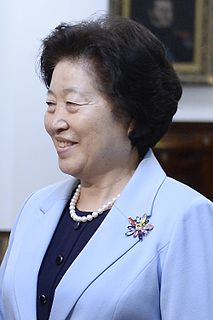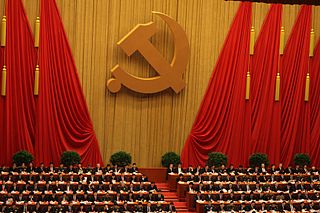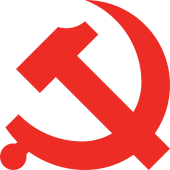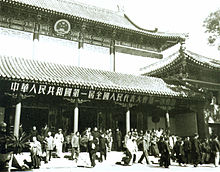
The Standing Committee of the Central Political Bureau of the Communist Party of China, usually known as the Politburo Standing Committee (PSC), is a committee consisting of the top leadership of the Communist Party of China. Historically it has been composed of five to eleven members, and currently has seven members. Its officially mandated purpose is to conduct policy discussions and make decisions on major issues when the Politburo, a larger decision-making body, is not in session. According to the party's Constitution, the General Secretary of the Central Committee must also be a member of the Politburo Standing Committee.

Hu Jintao is a Chinese politician who was the paramount leader of China from 2004 to 2012. He held the offices of General Secretary of the Communist Party of China (CPC) from 2002 to 2012, President of the People's Republic of China (PRC) from 2003 to 2013 and Chairman of the Central Military Commission (CMC) from 2004 to 2012. He was a member of the CCP Politburo Standing Committee, China's de facto top decision-making body, from 1992 to 2012.

The General Secretary of the Central Committee of the Communist Party of China is the Paramount leader of China. The General Secretary is the head of the Chinese Communist Party (CCP) and the highest-ranking official within the People's Republic of China (PRC). The General Secretary is a standing member of the Politburo and head of the Secretariat.
The orders of precedence in China is the ranking of political leaders in China for the purposes of event protocol and to arrange the ordering of names in official news bulletins, both written and televised. It is also sometimes used to assess perceived level of political power. Although there is no formally published ranking, there is usually an established convention and protocol, and the relative positions of Chinese political figures can usually be deduced from the order in meetings and especially by the time and order in which figures are covered by the official media.
Zeng Qinghong is a retired Chinese politician. He was a member of the Politburo Standing Committee of the Communist Party of China, China's highest leadership council, and top-ranked member of the Secretariat of the Central Committee between 2002 and 2007. He also served as the Vice-President of the People's Republic of China from 2003 to 2008.

The Central Secretariat of the Communist Party of China is a body serving the Politburo of the Communist Party of China and its Standing Committee. The secretariat is mainly responsible for carrying out routine operations of the Politburo and the coordination of organizations and stakeholders to achieve tasks as set out by the Politburo. It is empowered by the Politburo to make routine day-to-day decisions on issues of concern in accordance to the decisions of the Politburo, but it must consult the Politburo on substantive matters.
The Shanghai clique is the name given to an informal group of officials in the Communist Party of China, especially those who serve in the Central Committee or the Central Government of China, who rose to prominence in connection to the Shanghai municipal administration under Jiang Zemin, former General Secretary of the Communist Party of China.
Since both the Communist Party of China and the People's Liberation Army promote according to seniority, it is possible to discern distinct generations of Chinese leadership. In official discourse, each group of leadership is identified with a distinct extension of the ideology of the party. Historians have studied various periods in the development of the government of the People's Republic of China by reference to these "generations".

The Central Committee of the Communist Party of China is a political body that comprises the top leaders of the Chinese Communist Party (CCP). It is currently composed of 205 full members and 171 alternate members. Members are nominally elected once every five years by the National Congress of the Communist Party of China. In practice, the selection process is done privately, usually through consultation of the party's Politburo and its corresponding Standing Committee.
The 16th National Congress of the Communist Party of China was held in Beijing between November 8 and 14, 2002. It was preceded by the 15th National Congress of the Communist Party of China. 2,114 delegates and 40 specially invited delegates attended this and elected a 356-member 16th CPC Central Committee, as well as a 121-member Central Commission for Discipline Inspection (CCDI). The Congress marked the nominal transition of power between Jiang Zemin and Hu Jintao, who replaced Jiang as General Secretary, and a newly expanded Politburo Standing Committee line-up. The institutional transition would be completed in state organs by the 2003 National People's Congress in March. Jiang, however, remained head of the Central Military Commission, therefore in practice, the power transition was not complete. The Party National Congress examined and adopted the amendment to the Constitution of the Communist Party of China proposed by the 15th CPC Central Committee, and decided to come into force as from the date of its adoption. An amendment to the Constitution was approved the Party National Congress, with Jiang Zemin's signature ideology of "Three Represents" written into it. This congress was succeeded by the 17th National Congress of the Communist Party of China.

The Vice President of the People's Republic of China, formerly translated as Vice Chairman of the People's Republic of China from 1954 to 1975, is a senior position in the government of the People's Republic of China.
The 17th National Congress of the Communist Party of China was held in Beijing, China, at the Great Hall of the People from 15 to 21 October 2007. Congress marked a significant shift in the political direction of the country as CPC General Secretary Hu Jintao solidified his position of leadership. Hu's signature policy doctrine, the Scientific Development Concept, which aimed to create a "Socialist Harmonious Society" through egalitarian wealth distribution and concern for the country's less well-off, was enshrined into the Party Constitution. It was succeeded by the 18th National Congress of the Communist Party of China.
The Tuanpai, or Youth League Faction, is a term used by political observers and analysts to describe an informal political faction in the Communist Party of China, which includes cadres and government officials who originated from the Communist Youth League. There have been two "Youth League factions" in recent memory, without direct political lineage between each other. The first, in the 1980s, comprised cadres of Youth League background who supported party general secretary Hu Yaobang: the term "Tuanpai" was originally used to criticise Hu Yaobang for over-reliance of cadres of Youth League background. The second, from the 2000s, comprised party general secretary Hu Jintao and his group of populist associates and other political allies.

Li Yuanchao is a Chinese politician. He was the Vice President of the People's Republic of China from 2013 to 2018 and the Honorary President of the Red Cross Society of China. He was a member of the Secretariat of the Communist Party of China and head of its Organization Department between 2007 and 2012. From 2002 to 2007, Li served as the Communist Party of China Secretary of Jiangsu, the top leader of an area of significant economic development. Between 2007 and 2017, he held a seat for two terms on the Politburo of the Communist Party of China. Once considered a rising political star, Li gradually faded from the political scene.
The 17th Central Politburo of the Communist Party of China was elected by the 17th Central Committee of the Communist Party of China on October 22, 2007. Eventually, four members of this Politburo were expelled from the Communist Party for not adhering to the leading party thought. They were, in order of the time of expulsion, Bo Xilai, Xu Caihou, Zhou Yongkang, and Guo Boxiong. This politburo was preceded by the 16th Politburo of the Communist Party of China and succeeded by the 18th Politburo of the Communist Party of China.

Sun Chunlan is a Chinese politician, a member of the Politburo of the Communist Party of China, and a Vice Premier of the People's Republic of China. From 2009 to 2014, Sun served in two prominent regional posts, first as Communist Party Secretary of Fujian province, then Party Secretary of Tianjin, one of China's four direct-controlled municipalities. Her tenure in Fujian made her the second female provincial-level party chief since the founding of the People's Republic of China in 1949. Between 2014 and 2017, she served as head of the United Front Work Department of the Central Committee of the Communist Party of China.

The 18th National Congress of the Communist Party of China began on November 8, 2012 at the Great Hall of the People. It was preceded by the 17th National Congress of the Communist Party of China. Due to term and age limits restrictions, seven of the nine members of the powerful Politburo Standing Committee (PSC) retired during the Congress, including Hu Jintao, who was replaced by Xi Jinping as General Secretary of the Communist Party of China. The Congress elected the 18th Central Committee of the Communist Party of China, and saw the number of Politburo Standing Committee seats reduced from nine to seven. It was succeeded by the 19th National Congress of the Communist Party of China.

Wang Huning is a Chinese political theorist and one of the top leaders of the Communist Party of China, a current member of the party's Politburo Standing Committee and first-ranked secretary of the party's Secretariat. He served as secretary of the Secretariat between 2007 and 2012, and as the head of the Central Policy Research Office since 2002. He was named chairman of Central Guidance Commission on Building Spiritual Civilization in November 2017.
The succession of power in China takes place in the context of a single party system. Despite the guarantee of universal franchise in the constitution, the appointment of the Paramount Leader lies largely in the hands of his predecessor and the powerful factions that control the Central Committee of the Communist Party of China. The appointment of the leader occurs after two five year terms in accordance with the Constitution of the People's Republic of China. But this was changed to three of four five year terms during the first plenary session of the 19th national Congress of the Communist Policy of China.
The organization of the Chinese Communist Party (CCP) is based upon the Leninist idea of democratic centralism.










